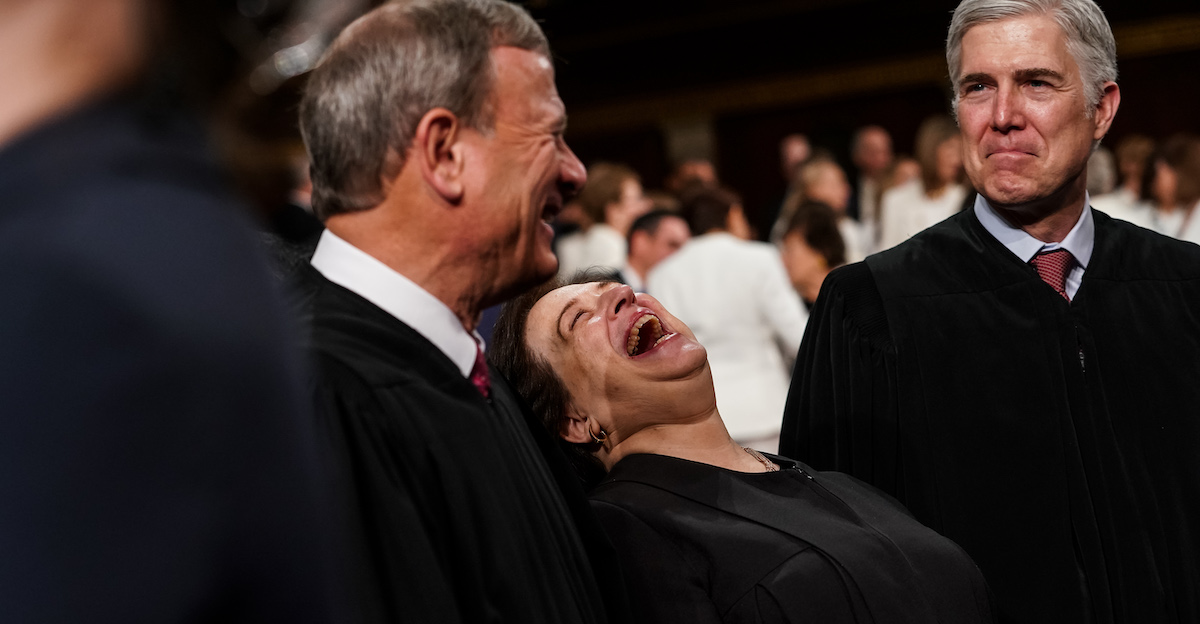
Legal observers served up criticism on Thursday after the U.S. Supreme Court chided the U.S. Court of Appeals for the Ninth Circuit for an “abuse of discretion.” The bottom line here, according to these lawyers, is that the Supreme Court does the very thing that it scolded: seizing on issues that weren’t presented in briefs by the parties to a case.
Earlier on Thursday, Law&Crime reported on the Supreme Court’s decision to upbraid the Ninth Circuit for deciding a case that court seemed to design for itself rather than the case that was presented by the parties. Rather than rendering an opinion on whether it was illegal for immigration consultant Evelyn Sineneng-Smith under 8 U.S.C. § 1324 to “encourage or induce an alien to come to, enter, or reside in the United States,” the Supreme Court bashed the Ninth Circuit for going out of its way to answer the question in the first place.
The SCOTUS unanimously held — with Justice Ruth Bader Ginsburg penning the opinion of the court and Clarence Thomas writing a concurrence — that the Ninth Circuit flouted the “principle of party presentation.”
“That principle forecloses the controlling role the Ninth Circuit took on in this case. No extraordinary circumstances justified the panel’s takeover of the appeal. Sineneng-Smith, represented by competent counsel, had raised a vagueness argument and First Amendment arguments homing in on her own conduct, not that of others,” the Supreme Court ruled. “Electing not to address the party-presented controversy, the panel projected that [8 U.S.C.] §1324(a)(1)(A)(iv) might cover a wide swath of protected speech, including abstract advocacy and legal advice. It did so even though Sineneng-Smith’s counsel had presented a contrary theory of the case in her briefs and before the District Court.”
The Supreme Court called the Ninth Circuit‘s hijacking of the case a “radical transformation” that went “well beyond the pale;” the Ninth Circuit was called out specifically for inviting three amici curiae (non-parties) to “brief and argue issues framed by the panel, including a question Sineneng-Smith herself never raised earlier.”
Lawyers read these words and said they immediately thought of another court that plays fast and loose with the “principle of party presentation”: the Supreme Court of the United States.
“I’m old enough to remember when SCOTUS hijacked a narrow case in Citizens United and ordered re-argument in order to grant wildly expansive, democracy destabilizing relief that the plaintiff had not sought below (and [for] which [t]here was no factual record in a trial court)!!!” commented attorney Jeff Hauser, director of anti-political corruption group the Revolving Door Project.
University of Texas law professor Steven Vladeck similarly turned the tables on SCOTUS.
“#SCOTUS’s opinion in Sineneng-Smith chastises the Ninth Circuit for something the Justices do *all the time*—focus on issues not raised in the parties’ briefs. Indeed, the Court just asked *last week* for the parties in the Trump tax cases to brief an issue they hadn’t addressed,” he said. “Justice Ginsburg certainly tries to explain why what the Ninth Circuit did here differs from what #SCOTUS has (repeatedly) done—even providing an appendix with examples. But I’m not sure there’s such a coherent line between #SCOTUS’s practice and what the Ninth Circuit did here.”
“And if the analytical distinctions don’t hold up, then the only remaining distinction is that lower courts are subject to the ‘party presentation’ principle far more than #SCOTUS itself is. That may be what the Justices *think*, but it’s telling that they don’t actually *say* so,” Vladeck concluded.
Still others said that SCOTUS had arguably done the very thing it was criticizing in this case.
Indeed, one might say that SCOTUS ended up doing just that _in this case_. The grounds on which it reversed were not the ones the government sought cert on or really even argued.
— Sasha Samberg-Champion (@ssamcham) May 7, 2020
“Indeed, one might say that SCOTUS ended up doing just that _in this case_. The grounds on which it reversed were not the ones the government sought cert on or really even argued,” former Department of Justice attorney and current civil rights lawyer Sasha Samberg-Champion said.
The observations and debate continued.
It’s honestly a little weird to see SCOTUS acting like a regular appeals court.
— Andrew Fleischman (@ASFleischman) May 7, 2020
National security lawyer Kel McClanahan arguably summed up the growing consensus: SCOTUS applied the “quod ego dico sic” (“because I say so”) doctrine in U.S. v. Sineneng-Smith.
Yeah, well, that’s different. It’s the well known canon, quod ego dico sic.
— National Security Counselors (@NatlSecCnslrs) May 7, 2020
[Image via Doug Mills/The New York Times pool photo]